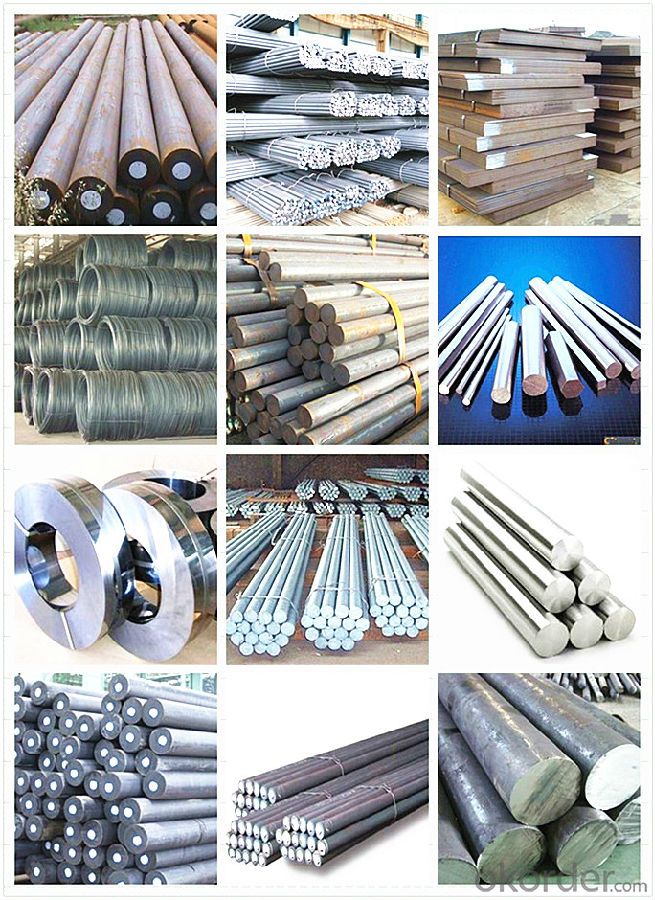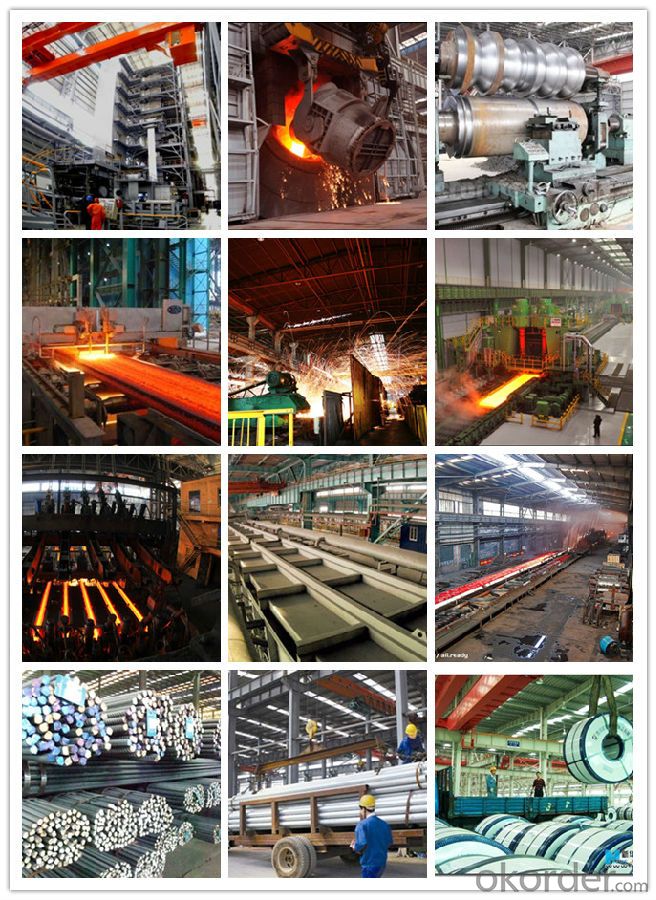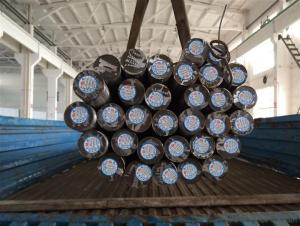Special Steel Carbon Steel Round Bar JIS S10C
- Loading Port:
- China main port
- Payment Terms:
- TT OR LC
- Min Order Qty:
- 30 m.t.
- Supply Capability:
- 10000 m.t./month
OKorder Service Pledge
OKorder Financial Service
You Might Also Like
Item specifice
Product Information
1 Grade Comparison:
GB | ASTM | JIS | DIN |
10# | SAE1010/AISI1010 | S10C | C10 (1.0214) |
2 Chemical Composition:
C | Si | Mn | P | S | Cr | Ni | Cu |
0.08-0.13 | 0.15-0.35 | 0.30-0.60 | ≤0.03 | ≤0.03 | ≤0.20 | ≤0.25 | ≤0.25 |
3 Brief Introduction:
Dimension | 13-350mm |
Length | 2-13m or as per your request |
Delivery condition | Hot rolled |
Heat Treatment | Normalizing, Annealing, Quenching |
Packing | Standard seaworthy packing or according to your requirements |
4 Mechanical Property:
Yield Strength (MPa) | ≥205 |
Tensile Strength (MPa) | ≥335 |
Elongation (%) | ≥31 |
Hardness (HB) | ≤137 |
Reduction in Area (%) | ≥55 |
Product Show

Workshop Show

Shipping
1. FedEx/DHL/UPS/TNT for samples, Door-to-Door;
2. By Air or by Sea for batch goods, for FCL; Airport/ Port receiving;
3. Customers specifying freight forwarders or negotiable shipping methods!
Delivery Time: 3-7 days for samples; 5-25 days for batch goods.
Payment Terms
1.Payment: T/T, L/C, Western Union, MoneyGram,PayPal; 30% deposits; 70% balance before delivery.
2.MOQ: 1pcs
3.Warranty : 3 years
4.Package Informations: 1) EXPORT, In 20 feet (GW 25 ton) or 40 feet Container (GW 25 ton)
2)as customer's requirement
Why choose us?
(1) The leading exporter in China special steel industry.
(2) Large stocks for various sizes, fast delivery date.
(3) Good business relationship with China famous factories.
(4) More than 7 years steel exporting experience.
(5) Good after-sales service guarantee.
- Q:What are the requirements for special steel used in high-temperature applications?
- The requirements for special steel used in high-temperature applications include excellent heat resistance, high strength at elevated temperatures, good oxidation and corrosion resistance, and the ability to retain mechanical properties under extreme heat conditions. Additionally, these steels should have sufficient creep resistance, thermal stability, and resistance to thermal fatigue.
- Q:How is corrosion-resistant steel used in marine applications?
- Corrosion-resistant steel is extensively used in marine applications due to its ability to withstand the harsh environment of seawater. It is employed in the construction of various marine structures such as ships, offshore platforms, and coastal infrastructure. This type of steel provides exceptional resistance to corrosion, preventing the degradation of materials and ensuring the longevity and safety of marine structures. Additionally, corrosion-resistant steel is used in the production of marine equipment, such as propellers, valves, and pipelines, as it offers superior durability and protection against corrosion caused by saltwater exposure.
- Q:What are the requirements for special steel used in cryogenic applications?
- Special steel used in cryogenic applications must meet several requirements to ensure its performance and reliability in extreme low-temperature environments. Firstly, the steel should have excellent low-temperature toughness to withstand the extreme cold. This means that it should be able to resist brittle fracture and maintain its mechanical properties even at cryogenic temperatures. The steel should have a high toughness and ductility to absorb impact and prevent cracking. Secondly, the steel must have a low coefficient of thermal expansion. This is important because cryogenic applications involve significant temperature changes, and a high coefficient of thermal expansion can lead to dimensional instability and stress within the material. A low coefficient of thermal expansion helps to minimize these effects and maintain dimensional stability. Thirdly, the steel should have a low thermal conductivity. Cryogenic applications often involve the transfer or storage of extremely cold substances, and a low thermal conductivity helps to prevent heat transfer and maintain the desired temperature. This is particularly important for applications where temperature control is critical, such as in the storage of liquefied gases. Additionally, the steel should have good corrosion resistance. Cryogenic environments can be highly corrosive, and the steel needs to be able to withstand the effects of any corrosive substances that may be present. This is particularly important for applications involving the storage or transportation of cryogenic liquids or gases. Finally, the steel should have good weldability. In many cryogenic applications, welding is required to join different components or sections of the steel. Therefore, the steel must have good weldability to ensure strong and reliable joints. In summary, the requirements for special steel used in cryogenic applications include excellent low-temperature toughness, low coefficient of thermal expansion, low thermal conductivity, good corrosion resistance, and good weldability. Meeting these requirements ensures that the steel can withstand the extreme cold and harsh conditions of cryogenic environments while maintaining its structural integrity and performance.
- Q:How does aluminum contribute to the properties of special steel?
- Aluminum is commonly added as an alloying element in special steel to enhance its properties. By adding aluminum to steel, several improvements can be achieved. Firstly, aluminum improves the strength of steel by forming a fine dispersion of aluminum nitride particles within the steel matrix. These particles act as barriers to dislocation movement, impeding the deformation of the steel and increasing its strength. This makes the steel more resistant to mechanical stresses and enhances its load-bearing capacity. Secondly, aluminum also enhances the corrosion resistance of steel. It forms a protective oxide layer on the surface of the steel, acting as a barrier against the corrosive agents. This oxide layer prevents the steel from oxidizing, rusting, and deteriorating over time, making it more durable and long-lasting in various environments. Additionally, aluminum can improve the machinability of special steel. Its presence in the steel composition reduces the tendency of the steel to work harden during machining operations. This makes it easier to cut, drill, or shape the steel, resulting in improved productivity and reduced tool wear. Moreover, aluminum contributes to the heat resistance of special steel. It has a high melting point and good thermal conductivity, which helps in maintaining the structural integrity of the steel at elevated temperatures. This makes aluminum-steel alloys suitable for applications where high-temperature resistance is required, such as in the aerospace and automotive industries. In summary, aluminum contributes significantly to the properties of special steel. It enhances the strength, corrosion resistance, machinability, and heat resistance of steel, making it a versatile material with a wide range of applications.
- Q:How does special steel perform in terms of thermal expansion?
- Special steel typically has a lower coefficient of thermal expansion compared to other types of steel. This means that it expands and contracts less when subjected to temperature changes, resulting in better dimensional stability and reduced risk of warping or cracking.
- Q:How does special steel contribute to reducing product costs?
- Special steel contributes to reducing product costs in several ways. Firstly, special steel is known for its high strength and durability, which allows manufacturers to design and produce products that have a longer lifespan. This reduces the need for frequent replacements or repairs, thus saving costs in the long run. Additionally, special steel can be customized to meet specific requirements, allowing for the production of lighter and more efficient products. This can lead to savings in terms of raw material usage, transportation costs, and energy consumption. Moreover, special steel often has excellent corrosion resistance, reducing the need for additional protective coatings or maintenance, which can also result in cost savings. Overall, the utilization of special steel in manufacturing processes helps optimize product performance, longevity, and efficiency, thereby contributing to reducing product costs.
- Q:How does special steel contribute to the manufacturing of bearings?
- Special steel plays a crucial role in the manufacturing of bearings as it offers enhanced strength, durability, and corrosion resistance. The unique properties of special steel, such as high hardness and wear resistance, allow bearings to withstand heavy loads and operate at high speeds. Additionally, special steel alloys can be tailored to specific application requirements, ensuring optimal performance and longevity of bearings in various industries.
- Q:Is special steel suitable for manufacturing molds and dies?
- Yes, special steel is highly suitable for manufacturing molds and dies. Special steel refers to a group of high-quality steels that possess exceptional properties such as high hardness, wear resistance, toughness, and excellent heat resistance. These characteristics make special steel an ideal choice for mold and die manufacturing. Molds and dies are critical components in various industries such as automotive, aerospace, electronics, and manufacturing. They are used to shape, form, and cut materials into desired shapes and sizes. Due to the repetitive and intense nature of their applications, molds and dies are subjected to high pressures, temperatures, and abrasive forces. Therefore, they need to be made from a material that can withstand these conditions while maintaining their dimensional stability and performance. Special steel, such as tool steel, is specifically designed to meet these requirements. It has a high hardness level, which enables it to resist wear and deformation, even under extreme conditions. This characteristic ensures that molds and dies made from special steel can maintain their shape and precision for a longer period, resulting in better product quality and reduced downtime for maintenance and replacement. Additionally, special steel offers excellent heat resistance, which is crucial for molds and dies used in high-temperature applications such as plastic injection molding or forging. It can withstand the thermal cycling and rapid heating and cooling associated with these processes without losing its mechanical properties or developing cracks or deformation. Moreover, special steel is known for its exceptional toughness, which is essential for molds and dies that are subjected to high pressures and impacts. It can absorb and distribute the applied forces, preventing premature failure and prolonging the lifespan of the molds and dies. In summary, special steel is highly suitable for manufacturing molds and dies due to its high hardness, wear resistance, toughness, and excellent heat resistance. Its exceptional properties ensure that molds and dies can withstand the demanding conditions of their applications, resulting in improved performance, longevity, and cost-effectiveness for manufacturers.
- Q:What are the different applications of special steel in the construction industry?
- Special steels have a wide range of uses in the construction industry, serving as versatile materials. Structural components are one of the main applications of special steel in construction. Buildings, bridges, and infrastructure projects that require exceptional strength and durability often use special steels, including high-strength low-alloy (HSLA) steel and weathering steel. Apart from structural uses, special steel is extensively employed in pipeline construction. This is particularly significant for oil and gas pipelines, where corrosion resistance and the ability to withstand high-pressure conditions are vital. Stainless steel, for example, is commonly chosen due to its outstanding resistance to corrosion, which makes it ideal for harsh environments. Another important application of special steel in construction is the production of reinforcing bars, also known as rebars. Reinforcing steel bars reinforce concrete structures like buildings, bridges, and highways by adding strength to withstand tension forces. Special steel rebars, such as micro-alloyed steel or carbon steel, are designed specifically to enhance the durability and structural integrity of concrete structures. Furthermore, special steel is extensively used in the construction of high-rise buildings and skyscrapers. The exceptional strength, ductility, and fire resistance properties of special steels like carbon steel or alloy steel make them perfect for constructing tall structures capable of withstanding heavy loads and resisting fire incidents. Special steel also finds application in the construction of equipment and machinery used in the construction industry. For instance, high-speed steel (HSS) is commonly utilized in manufacturing cutting tools, drill bits, and saw blades, which are essential for various construction activities. HSS possesses exceptional hardness, wear resistance, and high-temperature strength, making it suitable for heavy-duty cutting and drilling applications. In conclusion, special steel is an essential material in the construction industry due to its superior strength, durability, corrosion resistance, and fire resistance properties. It serves various purposes in structural components, pipelines, reinforcing bars, high-rise buildings, and construction machinery. Special steel ensures the safety, longevity, and reliability of construction projects, making it indispensable in the industry.
- Q:How long does special steel last compared to regular steel?
- Due to its unique composition and properties, special steel tends to have a longer lifespan than regular steel. Regular steel primarily consists of iron and carbon, while special steel is alloyed with elements like chromium, nickel, and molybdenum to enhance its strength, hardness, and resistance to corrosion. The lifespan of special steel is influenced by factors such as the specific type of steel, its usage conditions, and maintenance practices. However, in general, special steel has a significantly longer lifespan compared to regular steel. It exhibits greater resistance to wear and tear, corrosion, and high temperatures, making it suitable for demanding applications and environments. Industries such as aerospace, automotive, and construction extensively utilize special steel for critical components like engine parts, structural elements, and cutting tools. These components often endure high stress, friction, and exposure to harsh conditions. Special steel's exceptional properties enable it to withstand these challenges and maintain its performance for an extended period. Furthermore, special steel undergoes rigorous testing and quality control measures during its manufacturing process. This ensures that it meets specific industry standards and can endure extreme conditions without significant degradation. In contrast, regular steel may not possess the same level of durability or longevity. In conclusion, special steel generally lasts longer than regular steel due to its enhanced properties and resistance to wear, corrosion, and high temperatures. Although the exact lifespan may vary depending on various factors, special steel's superior characteristics contribute to its prolonged durability.
1. Manufacturer Overview |
|
|---|---|
| Location | |
| Year Established | |
| Annual Output Value | |
| Main Markets | |
| Company Certifications | |
2. Manufacturer Certificates |
|
|---|---|
| a) Certification Name | |
| Range | |
| Reference | |
| Validity Period | |
3. Manufacturer Capability |
|
|---|---|
| a)Trade Capacity | |
| Nearest Port | |
| Export Percentage | |
| No.of Employees in Trade Department | |
| Language Spoken: | |
| b)Factory Information | |
| Factory Size: | |
| No. of Production Lines | |
| Contract Manufacturing | |
| Product Price Range | |
Send your message to us
Special Steel Carbon Steel Round Bar JIS S10C
- Loading Port:
- China main port
- Payment Terms:
- TT OR LC
- Min Order Qty:
- 30 m.t.
- Supply Capability:
- 10000 m.t./month
OKorder Service Pledge
OKorder Financial Service
Similar products
New products
Hot products
Related keywords






























